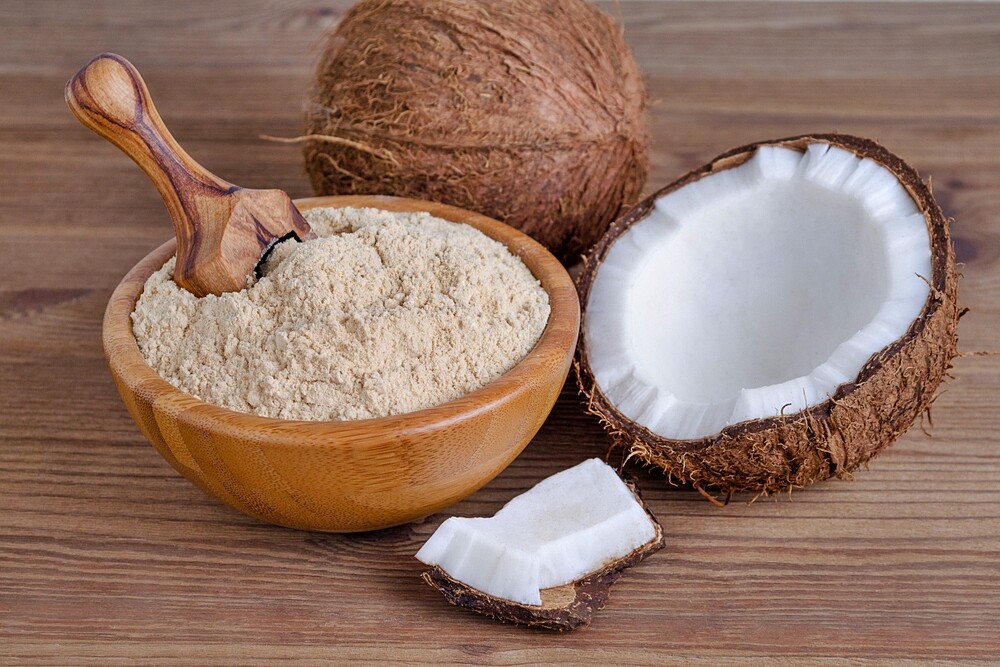Coconut flour has an excellent reputation. But is it really suitable as a flour alternative and does it even help you lose weight?
How is coconut flour produced?
- Coconut flour is on everyone’s lips, but what is actually behind it? The white coconut flour comes from the pulp of fresh coconuts. These must first be dried and then strongly de-oiled.
- The resulting coconut oil is also very healthy and is offered in various supermarkets and also in online shops.
Ingredients of coconut flour
Coconut flour is rich in nutrients. The coconut consists of many vitamins and minerals, which are very healthy. In general, all products made from the coconut – from coconut water to coconut milk – are excellent sources of nutrients.
However, unlike coconut flour, they contain a lot of fat and therefore also a large number of calories. Since coconut flour is heavily de-oiled, it contains only about a quarter of the calories of fresh coconut meat. But nevertheless it provides us with very valuable ingredients.
We have summarized the best and most important ingredients of flour for you:
- Vitamin C
- Vitamin B6
- Vitamin B2
- Potassium
- Magnesium
- Phosphorus
- Calcium
- Iron
- Manganese
- Zinc
- Medium chain fatty acids
- Various amino acids
Coconut flour: Nutritional values (100 g)
- Calories: 320 kcal
- Protein: 19,3 g
- Carbohydrates: 8,9 g
- Fat: 11,8 g
Coconut flour: Advantages
- Rich in dietary fibre
- Many proteins
- Gluten Free
- Cholesterol Free
- Healthy fats
- Few carbohydrates
- Low glycaemic index
- Vegan
If you like, coconut oil has only one noticeable disadvantage – the price. A kilo of flour costs an average of 9 euros and is therefore considerably more expensive than wheat flour (about 70 cents) or organic wheat flour (about 1.90 euros).
Coconut flour: Healthy alternative?
The list of advantages has already shown it: coconut flour is a very healthy flour alternative. The flour is also suitable for people with diabetes or gluten intolerance. Even though it is more expensive than conventional flour, you can save a lot when using it in baking and cooking (see below).
Tip: Look for premium quality when buying coconut oil. Sustainable organic coconut flour is grown fairly and sustainably and provides the best quality in terms of ingredients and processing.
Coconut flour: Good for losing weight?
- Since coconut flour is strongly de-oiled, it is also suitable for use in a diet or as part of a balanced diet. The flour contains few but healthy fats and hardly any carbohydrates. With just over 300 calories (100 g) it is also not a calorie bomb. Especially for muesli, the oil is perfect for rounding off.
- The flour can also be used in a low-carb diet due to its low carbohydrate content. The flour contains only about 9 grams of carbohydrates per 100 grams. In addition, coconut flour contains a lot of dietary fibres, which provide an excellent feeling of satiety. An important factor for losing weight.
- Also helpful: Coconut flour tastes sweet by nature and can therefore make the use of additional sugar unnecessary when baking and cooking. The flour is also easily digestible and the medium-chain fatty acids stimulate the metabolism.
Tips for use
When cooking and baking, disillusionment can quickly spread if you do not know the correct dosage beforehand. Coconut flour binds liquids like a sponge. But you can make use of this property especially when cooking. Especially for soups and stews or sauces, coconut flour is a perfect binder due to this property.
Important: For recipes that refer to normal cereal flour in their quantities, you must adjust the quantity of coconut flour. Normally, you only use about a quarter of the regular amount of wheat flour. This also compensates for the more expensive price of the flour.
In principle, you can easily replace wheat flour with coconut flour. You should note, however, that coconut flour has a mild, nutty taste. Recipes with coconut flour therefore usually refer to desserts and desserts, which the flour enriches with its taste.
You can use coconut flour especially well for the following recipes:
- Coconut cookies
- Waffles
- Muffins
- Paleo bread
- Coconut cake
- Pancakes
Storing coconut flour correctly
High-quality coconut flour has a very long shelf life. Depending on the product, a shelf life of up to two years is absolutely normal. It is important that you store the low-fat flour in a dry place at room temperature. Protect the flour from sunlight and make sure that the packaging is always well sealed.

